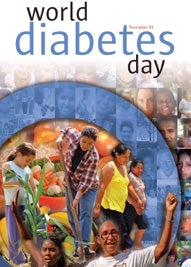
Washington, D.C, 14 November 2011 (PAHO/WHO) — The number of people suffering from diabetes in the Americas is expected to grow from 55 million in 2000 to 83 million by 2030, an increase of 50 percent, according to the International Diabetes Federation. Studies at the national level show that the prevalence of diabetes is increasing in all age groups in the hemisphere and may be reaching epidemic proportions.

The Pan American Health Organization/World Health Organization (PAHO/WHO) has made diabetes a top health priority and is working with its Member States to implement strategies for prevention and control. On World Diabetes Day, Nov. 14, PAHO/WHO is launching a new virtual course on diabetes self-care, aimed at Latin American health professionals who want to provide comprehensive care for patients with diabetes. The course is available (in Spanish only) on the Virtual Campus of Public Health.
Diabetes is a chronic disease that occurs when the pancreas does not produce enough insulin or when the body cannot effectively use the insulin it produces. Insulin is a hormone that regulates blood sugar. Uncontrolled diabetes can cause hyperglycemia, or raised blood sugar, and over time can lead to serious damage to many of the body's systems, especially the nerves and blood vessels. Type 2 diabetes accounts for 90 percent of diabetes cases globally and is largely the result of excess body weight and physical inactivity. The prevalence of type 2 diabetes is increasing throughout the Americas and the world.
Surveys at the national level show that in Chile, diabetes (diagnosed and undiagnosed) increased nearly 50 percent between 2003 and 2010, from 6.3 percent to 9.4 percent of the population, and in Argentina, diagnosed diabetes increased 14 percent between 2005 and 2009, from 8.4 percent to 9.6 percent. .
In Latin America and the Caribbean, the cost of diabetes as of 2002 was estimated at US$65 billion, mostly due to premature deaths and disability. More than 80 percent of diabetes deaths occur in low- and medium-income countries..
In 2008, PAHO's Directing Council endorsed "Population-based and Individual Approaches to the Prevention and Management of Diabetes and Obesity," which calls on countries to step up efforts in this area. PAHO/WHO has been working with its member countries to implement these approaches, particularly in the areas of screening for diabetes and pre-diabetes and other measures for prevention and treatment..
Diabetes care presents a major challenge for health services. Cases require comprehensive, continuous care that recognizes the central role of patients in managing their own health. Although diabetes and its complications are largely preventable, patients often lack sufficient knowledge about prevention and often lack access to proper care..
Healthy diet, regular physical activity, maintaining a normal body weight and avoiding tobacco use can prevent or delay the onset of type 2 diabetes..
Links



